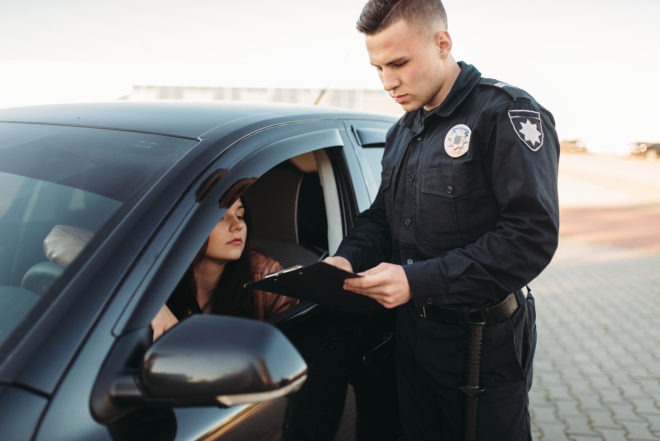

Call Attorney Marni Jo Snyder 24 Hours / 7 Days:
215.515.3360
Three situations exist where the police can lawfully make a vehicle stop for suspicion of a DUI in Pennsylvania.
The police can stop a vehicle during a DUI checkpoint, which are roadblocks conducted by the police who are permitted to make random stops to check for intoxicated drivers.
Another situation exists where the police officer has reasonable suspicion under Pennsylvania Vehicle Code (75 Pa. C.S.A. §6308(b)) to believe that the driver is under the influence of either alcohol or drugs.
Reasonable suspicion is defined as a reasonable and articulable presumption based on the circumstances involved, along with the officer’s training experience, to believe that the driver is under the influence. It must be more than a mere hunch that the driver is intoxicated but something based on the facts the officer observed. For instance, if the driver was swerving, driving significantly above or below the speed limit or otherwise driving erratically, the officer may have reasonable suspicion.
Third, police may stop a vehicle if the driver violated the Vehicle Code, including speeding, failing to stop at a stop sign or red light, or driving the wrong way on a one-way street. The reasons for the stop can be unrelated to the driver being intoxicated so long as the driver violated some other provision of the Vehicle Code.
For a free legal consultation, call 215.515.3360
Once the vehicle is stopped, the officer will observe the driver, using factors taught to him or her through training on what to look for when making a determination that the driver is under the influence.
If the officer has probable cause to believe that the individual is driving under the influence, the police may have reason to search the person or the person’s property, conduct a blood or breath test, or make an arrest for a DUI. Probable cause is a logical inference, based on the facts and evidence before the officer at that time, that a crime has been committed. If the officer has this probable cause, then he or she can make an arrest for a DUI.
Several different factors can support probable cause, including the officer noticing open alcohol containers in the car, smelling alcohol from the vehicle or on the person’s breath, and noticing the person’s speech slurring. The officer may also conduct field sobriety tests and blood and breath tests to help support this probable cause.
If the officer believes he or she has probable cause that the driver is operating the vehicle under the influence of alcohol or a controlled substance, he or she can then make an arrest.
The Pennsylvania Supreme Court has defined an arrest as “any act that indicates an intention to take that person into custody and subjects him to the control and will of the person making the arrest.”
In other words, an arrest occurs when a reasonable person would believe he or she is not free to go. The court will look at many factors to determine whether a defendant was in custody at the time of the chemical testing, statement, or confiscation of objects. Handcuffing a person is an obvious act of an arrest, along with reading the person his or her Miranda rights.. A person can claim that they are in custody even if these things are not done.
The police can use three different tests to determine blood alcohol content (BAC). The most common test in Pennsylvania was the alcohol breath test, also known as a breathalyzer, where the person breathes into a machine which measures the level of alcohol in someone’s blood through breath.
Field sobriety tests are also a method of testing for intoxication, although they are somewhat unreliable if the tests are not administered properly.
An actual blood test can also be used to test for the person’s BAC if the person refuses to take the field sobriety test or breathalyzer or if the police deem the blood test necessary. Blood tests are the current favorite practice of police in Pennsylvania because they can also test for controlled substances.
The police are not allowed to search someone’s car without a warrant even if they do suspect that the person has been operating the vehicle while under the influence of alcohol or drugs.
However, certain circumstances do exist which allow the police to search. For instance, if the driver gives the police consent to search, the officer does obtain a warrant, or if probable causes exists for searching the car, the car may be searched. If the officer believes that he or she needs to search the car for his or her own safety, the search may be acceptable, and if the person has been arrested and items relating to their arrest may be found in the car, a search may be conducted.
DUI charges can be fought by way of a motion to suppress and/ or a trial, but you need a very skilled attorney who knows the current state of the law to defend you. If you have been arrested for a DUI and need a criminal defense lawyer, act fast and call 215-515-3360. We can help 24 hours per day, 7 days per week, including holidays.
Call 24/7: 215.515.3360
Email: info@snyderlawyer.com
Fax: 215-376-6981
This website is for general informational purposes only. The act of sending an e-mail to the Firm or any attorney at the Firm, or submitting a form response or other materials through the website, will not create an attorney-client relationship. The only way to create an attorney-client relationship with the Firm is through a written agreement.Read More